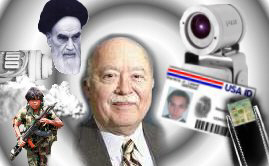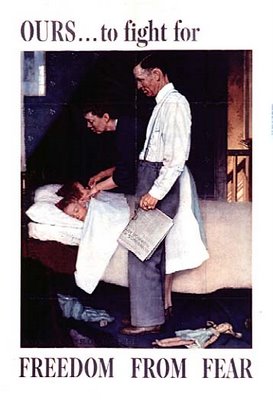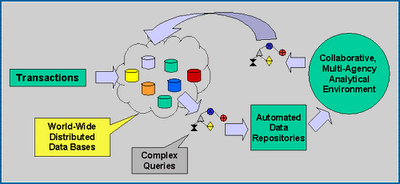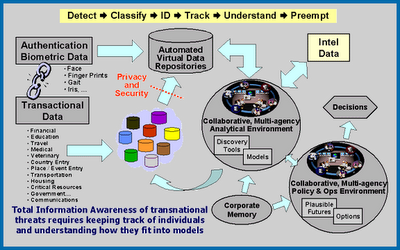
Missing Web Pages from the Information Awareness Office (IAO) Web site
The above Web pages were removed from the IAO Web site on Nov. 26, 2002. They were retrieved from the Google cache on Dec. 2, 2002.
http://www.thememoryhole.org/policestate/iao-bios.htm
I have repeated some of them here as part of history.


John M. Poindexter
Education
Ph.D., Physics, California Institute of Technology, 1964
M.S., Physics, California Institute of Technology, 1961
B.S., Engineering, U.S. Naval Academy, 1958
Experience Summary
Brings a unique blend of experience to problems from the highest levels of government to the laboratory. Demonstrated exceptional management and command ability ranging from naval operations to the national security of the United States. Noted for creative solutions to difficult issues and ability to quickly grasp the essence of new tasks. Goal oriented.
Professional Background
DARPA Information Awareness Office, Director
2002 - Present
The mission of the Information Awareness Office (IAO) is to imagine, develop, apply, integrate, demonstrate and transition information technologies, components, and prototype closed-loop information systems that will counter asymmetric threats (most notably, terrorist threats) by achieving total information awareness: enabling preemption; national security warning; and, national security decision making.
SYNTEK Technologies, Senior Vice President
1996 - 2002
SYNTEK is a small high technology firm with contracts in domestic and international defense and commercial business. Poindexter was responsible for high-level advice on management and direction of information systems projects (for example Defense Advanced Research Project Agency's Project Genoa).
TP Systems, Inc., Co-founder
1990 - 1996
TP Systems was a software development firm specializing in commercial software for the IBM PC's and compatibles. Poindexter was the chief designer and programmer. Development included a symbolic debugger for multi-tasking environments, a BBS communications program plus numerous utility programs.
Elkins Group, Consultant
1993 - 1996
Elkins was a business alliance with Electronic Data Systems (EDS), has developed Elkins Interactive Training Network (EITN), a satellite based training delivery system that has world-wide marketing potential. Poindexter was the Chairman of the Maritime Advisory Committee and a member of the Board of Directors. He also provided advice on strategic planning.
Presearch, Inc., Senior Scientist
1988 - 1989
Presearch had primarily been involved with defense studies and analysis. Faced with anticipated defense budget reductions, Poindexter joined the firm to develop new commercial enterprises. He designed and developed hardware and software for the prototype of a digital real-time, imaging system to be used for physical security of high value facilities. It was used to obtain a contract for nuclear power plant security system.
The White House
National Security Advisor
1985 - 1986
Dep. National Security Advisor
1983 - 1985
Military Assistant
1981 - 1983
Joining President Reagan's White House staff in 1981, Poindexter was responsible for reviewing and improving the command and management systems to support The President in national security crisis management. Under Poindexter's leadership a new high technology crisis management center and secure video teleconferencing system were conceived, developed and created which greatly enhanced The President's ability in this vital area. As Deputy National Security Advisor, he was responsible for leading and managing the National Security Council Staff and was Chairman of the Crisis Pre-planning Group. As National Security Advisor, Vice Admiral Poindexter was responsible for providing recommendations to The President on national security, foreign policy and defense policy. He was directly involved in implementing The President's policies on a strong defense, freedom and democracy around the world, human rights, world hunger, economic and military assistance, combating terrorism and arms control.
Major events in which he played a significant role included: Strategic Defense Initiative, Grenada Rescue Operation, Achille Lauro incident, Libyan Operation to respond to terrorist attacks. Reykjavik Summit with Soviets, peaceful transition of government in the Philippines, support for the democratic resistance in Nicaragua, and an attempt to begin rationalization of U.S. relationship with strategically important Iran.
U.S. Navy, Numerous Positions
1958- 1987
As Deputy Commander Naval Education and Training Command, amongst his duties of commanding the U.S. Navy's extensive education and training programs, he initiated a project to develop a distributed data base management system for more efficient management of the training pipelines. When Commander of a destroyer squadron, he was Surface Warfare and ASW commander of battle groups in the Western Pacific and Indian Ocean and developed new tactics and battle management procedures under the Composite Warfare Commander concept. As Commanding Officer of a cruiser he pioneered the shipboard use of computers to manage the ship's force portion of yard overhauls. He has been an Executive Officer and a Chief Engineer of destroyers.
Significant staff assignments included: Executive Assistant to the Chief of Naval Operations, Administrative Assistant to the Secretary of the Navy and Special Assistant for Systems Analysis to the Secretary of Defense.
California Institute of Technology, Laboratory Assistant
1961-1964
Conducted laboratory research to further develop a model for understanding the Mossbauer Effect with Nobel Laureate Rudolph Mossbauer.

Dr. Robert L. Popp (Ph.D. Electrical Engineering '97)
Dr. Popp is Deputy Director of the DARPA Information Awareness Office, Arlington, VA. He is responsible for assisting the IAO Director in the oversight of programs and monitors the capabilities of existing and proposed information systems in the problem domains of the office to meet enhanced future threats and to identify and exploit advanced technologies offering potential solutions to deficiencies. He previously was Assistant Deputy Under Secretary of Defense, Advanced Systems & Concepts; Principal Scientist, Program Manager and Director of Business Development with ALPHATECH; and Senior Scientist and Program Manager with Bolt, Beranek and Newman (BBN). He has published more than 60 journal and conference technical papers and holds two U.S. patents.
Robert L. Popp
Deputy Director, Information Awareness Office
Education
Dr. Popp received his B.A. and M.A. degrees in computer science (summa cum laude, Phi Beta Kappa, distinction) from Boston University, and his Ph.D. degree in electrical engineering from the University of Connecticut.
Professional Background
Background Information
Dr. Popp has broad knowledge and expertise in military systems, IT, and a technical foundation that spans acoustic and radar signal processing, multi-sensor multi-target tracking, sensor data fusion, systems and software engineering, computer networking and data communications, security, parallel and distributed computing, and hardware design.
DARPA Information Awareness Office, Deputy Director
Dr. Popp is responsible for assisting the IAO Director in the oversight of programs and monitors the capabilities of existing and proposed information systems in the problem domains of the office to meet enhanced future threats and to identify and exploit advanced technologies offering potential solutions to deficiencies. Other responsibilities include assisting in the management of over $200 million of DoD RDT&E funds annually; oversight and analysis of solicited and unsolicited proposals submitted by other government agencies, private industry, and academia; and guidance to program managers in the translation of technical proposals into workable financial and management plans.
OSD (AT&L), Assistant Deputy Under Secretary of Defense, Advanced Systems & Concepts
Dr. Popp was responsible for the oversight of a portfolio of Advanced Concept Technology Demonstration (ACTD)
programs totaling over $600M in total value primarily focused on information operations, homeland security, critical infrastructure protection, security, and C4ISR. He also supported OSD (AT&L) projects to improve joint and coalition interoperability and to improve the transition of science and technology to acquisition and fielding.
ALPHATECH, Principal Scientist, Program Manager, and Director of Business Development
Dr. Popp managed and oversaw numerous ISR-related R&D and technology transition programs in airborne radar sensor data fusion and exploitation for situational awareness and precision engagement of ground moving targets.
BBN, Senior Scientist and Program Manager
Dr. Popp managed and oversaw several Navy- and DARPA-sponsored efforts in operational maritime undersea surveillance, anti-submarine warfare (ASW), network performance monitoring, and automated hardware design using FPGAs, hardware description languages and genetic programming techniques.
University of Connecticut, Adjunct Professor, Computer Science and Engineering (CS&E) Department
Dr. Popp lectured Computer Networking & Data Communications undergraduate course, emphasizing network protocols and architecture, LAN/MAN/WAN technologies, routing, internetworks, and UNIX client/server programming. He also lectured Digital Logic Design undergraduate course, emphasizing fundamentals in Boolean algebra, combinational and sequential logic, and LSI/MSI integrated circuit (IC) design.
Air Force Research Laboratory (AFRL), Visiting Research Scientist, Advanced Concepts Directorate
Dr. Popp developed parallel and distributed algorithms and software for several military/civilian air traffic surveillance problems. Implementations were in C/C++ and included multi-threaded shared-memory parallelizations for general-purpose
SUN multiprocessors and distributed-memory parallelizations for an Intel Paragon HPC.
Military Service
U.S. Air Force, Griffiss AFB, NY, Staff Sergeant (E-5) / Aircraft Maintenance Technician
Served on active duty in the 49th Fighter Interceptor Squadron and 416th Bomb Wing. Duties included flight-line and phase-dock aircraft maintenance for F106 fighters and B52 bombers. Honorable Discharge, AF Commendation Medal, Good Conduct Medal, Longevity Service Ribbon, Small Arms Expert Marksmanship.
Professional Affiliations
Dr. Popp is currently serving as the Associate Editor for the IEEE Transactions on Systems, Man, and Cybernetics (SMC), as Chairman of the IEEE SMC Society's Adaptive Computing Systems technical committee, and has chaired numerous IEEE conference sessions in high performance computing, aerospace systems, and information operations. He has published 3 book chapters, over 60 journal and conference technical papers, and is the holder of two patents.
http://www.computerbytesman.com/tia/poppbio.htm
Robert Popp, Ph.D.
Title: Deputy Office Director
Biography:
Dr. Robert Popp is presently serving as the Deputy Director of the Information Exploitation Office (IXO) at the Defense Advanced Research Projects Agency (DARPA). In this capacity, Dr. Popp assists the IXO Director in guiding and directing a portfolio of R&D programs focused on sensing, exploitation and C4ISR to improve US military capabilities in combat operations. Dr. Popp is also spearheading an R&D thrust focused on a range of post-Cold War era strategic threats and problems, with particular emphasis on Pre- and Post-Conflict Stability Operations (P2COP).
Dr. Popp previously served as a Special Assistant to the DARPA Director for Strategic Matters, and earlier as the Acting and Deputy Director of the Information Awareness Office (IAO). At IAO, Dr. Popp guided and directed a portfolio of R&D programs focused on a variety of information technology solutions for counter-terrorism, foreign intelligence and other national security concerns. Among those programs was the Terrorism Information Awareness (TIA) program.
Prior to DARPA, Dr. Popp served as an Assistant Deputy Under Secretary of Defense for Advanced Systems and Concepts (AS&C) within the Office of the Secretary of Defense (OSD). Dr. Popp directed and oversaw a number of Advanced Concept Technology Demonstration (ACTD) programs focused on cyber security, information operations, homeland defense, and command and control.
Before joining the government, Dr. Popp was a Senior Scientist and Program Manager with two defense contracting firms, BBN and ALPHATECH. Dr. Popp served as a principal investigator on numerous R&D programs focused on multi-sensor multi-target tracking and localization, automatic target recognition, anti-submarine warfare (ASW), and adaptive computing.
Dr. Popp has served as an Adjunct Professor of Computer Science at the University of Connecticut, and as a Visiting Research Scientist with the Air Force Research Labs. Dr. Popp has also served in the military-six years of active duty service in the US Air Force as an aircraft maintenance technician of B52 bombers and F106 fighters, and three years in the Air National Guard as a welder on F15 fighters. Prior to his military service, Dr. Popp was a welder on Trident nuclear submarines.
Dr. Popp received his B.A. and M.A. degrees in computer science from Boston University, and his Ph.D. degree in electrical engineering from the University of Connecticut. Dr. Popp has authored three book chapters, over seventy journal and conference papers, and is the holder of two patents. Dr. Popp presently serves as the Associate Editor for both the IEEE Transactions on Systems, Man and Cybernetics, and the Journal of Advances in Information Fusion. Dr. Popp is a member of the ACM, AAAS, senior member of the IEEE, and a lifetime member of HOG-Harley Owners Group.
Contact Information:
Robert Popp, Ph.D.
DARPA / IXO
3701 Fairfax Drive
Arlington, VA 22203-1714
http://dtsn.darpa.mil/ixodarpatech/ixo_FeatureDetail.asp?id=32
Thomas P. Armour (no photo available)
Mr. Armour is Program Manager for Project Genoa II, a new program in the Information Awareness office of the Defense Advanced Research Projects Agency (DARPA). Prior to returning to DARPA in January 2002 to take on this assignment, Mr. Armour was Chief Technology Officer at Creative Technology Incorporated of Herndon, Virginia.
Before retiring from US Government Service in December 2000, he had been detailed to the Information Systems Office of the Defense Advanced Research Projects Agency as a Program Manager.
Prior to this assignment, Mr. Armour had been an Intelligence Officer at the Central Intelligence Agency since 1975. His last assignment at CIA was Senior Technology Officer for the Directorate of Intelligence, responsible for helping the Directorate think strategically about the impact of technology on its business. Mr. Armour served as Chief of Information Technology for the DCI's Nonproliferation Center.
Prior to this assignment, Mr. Armour was on the staff of CIA's Deputy Director for Science and Technology where he was involved in the Directorate's strategic planning process and conducted ad hoc studies for the Deputy Director. Mr. Armour has had a number of analytic and managerial assignments in CIA's Directorate of Intelligence involving foreign strategic missiles, the proliferation of missile technology worldwide, and Soviet naval weapons systems and strategic command and control, low-observable programs, cruise missiles, and antiballistic missile systems. He served as chief of the Directorate's computing and methodological support group, which had responsibility for applying computing and methodological tools to intelligence analysis. The group was involved in the full range of computing activities from direct end-user support through the design, development, and procurement of large ADP systems. Mr. Armour also has served in staff positions within the Office of Scientific and Weapons Research with collection and arms control support responsibilities and was Executive Assistant to the Deputy and Associate Deputy Directors for Intelligence. Prior to his CIA employment, Mr. Armour was a navigator in the United States Air Force, where he flew combat missions on the AC-119K gunship in Vietnam and worldwide airlift missions on the C-141A aircraft. He is married and has a son born in 1975 and is a private pilot with PP-SE:-IA ratings.
Education:
ß MBA, Southern Illinois University, 1975.
ß Master of Electrical Engineering, Cornell University, 1971.
ß Bachelor of Science, Cornell University, 1970,
Electrical Engineering, with distinction
Dr. Michael Foster (no photo available)
Program Manager: FutureMap
Dr. Michael Foster manages the FutureMAP program in IAO and the QuIST program in IPTO. Prior to Dr. Foster's assignment at DARPA, he was Program Director and Division Director, Experimental and Integrative Activities, for the National Science Foundation (NSF). From 1984 to 1988, Dr. Foster served on the faculty at Columbia University. Dr. Foster holds the Ph.D. degree in Computer Science from Carnegie-Mellon University and an SB in Mathematics from MIT.
 So what is being done to protect blogs and bloggers?
So what is being done to protect blogs and bloggers?













